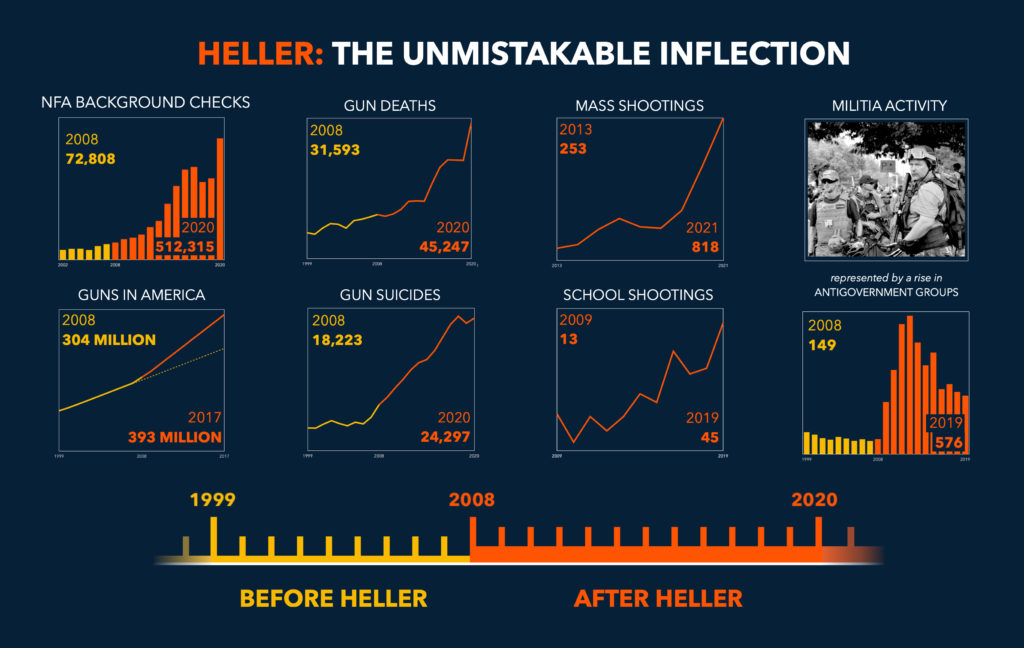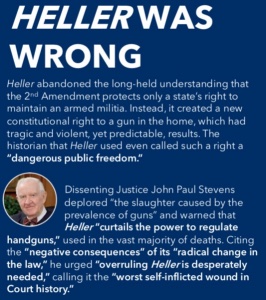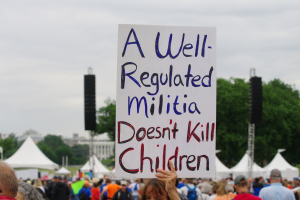 A Message from the American Enlightenment Project: Congressional Action Is Helpful but Not Enough, After Heller Put America in Peril
A Message from the American Enlightenment Project: Congressional Action Is Helpful but Not Enough, After Heller Put America in Peril
WASHINGTON, DC, US, June 16, 2022 /EINPresswire.com/ — Saturday’s second nationwide March for Our Lives – following another school shooting, this time in Uvalde, Texas where 19 elementary school children and 2 teachers were killed and 17 others wounded – led the next day to the first bipartisan movement in Congress in nearly 30 years. But the tentative Senate framework, focused on mental health, school security, and other minimal reforms, should it become law, “will have little impact on America’s worsening epidemic of gun violence,” says Robert Ludwig of Ludwig & Robinson PLLC, counsel for the American Enlightenment Project.
“This is serious business. We do not wish to be even minutely responsible for some unspeakably tragic act of mayhem because in the peace of our chambers we miscalculated as to Second Amendment rights.”
U.S. v. Masciandaro (4th Cir. 2011) (Wilkinson, J.)
After the first March for Our Lives following the Parkland high school massacre in 2018, retired Justice John Paul Stevens called minimal measures like universal background checks useful to reduce “mass killings of schoolchildren and others” but no cure, and encouraged students to “seek more effective and more lasting reform” and “demand a repeal of the Second Amendment” as interpreted in District of Columbia v. Heller (2008).
 In Heller, the Supreme Court found in the Second Amendment, for the first time in 220 years, an implied right to have a handgun in the home for self-defense. Courts throughout the 20th century had held that the amendment was meant “solely to protect the right of the states to keep and maintain armed militia.” Dissenting Justice Stevens later observed that all of the justices could foresee the “negative consequences” of Heller’s “radical change in the law.”
In Heller, the Supreme Court found in the Second Amendment, for the first time in 220 years, an implied right to have a handgun in the home for self-defense. Courts throughout the 20th century had held that the amendment was meant “solely to protect the right of the states to keep and maintain armed militia.” Dissenting Justice Stevens later observed that all of the justices could foresee the “negative consequences” of Heller’s “radical change in the law.”
Doubling down, the court is poised in coming weeks to expand Heller’s guarantee from the home to public carry, in N.Y.S. Rifle & Pistol Ass’n v. Bruen. Justice Stephen Breyer warned during oral argument that it would allow carrying a gun around any town just for fun, spawning chaos. In the one hopeful moment, Justice Amy Conan Barrett asked whether “Heller was rightly decided.” New York’s Solicitor General, Barbara Underwood, missing an opportunity, responded she was “quite content to treat it as rightly decided.”
 “Such contentment among gun control advocates generally,” says Mr. Ludwig, “is sleepwalking the country into a deepening crisis.” Time to Heed Justice Stevens’ Warnings about Heller.
“Such contentment among gun control advocates generally,” says Mr. Ludwig, “is sleepwalking the country into a deepening crisis.” Time to Heed Justice Stevens’ Warnings about Heller.
“Not only were the negative consequences foreseeable in Heller,” Mr. Ludwig continues, “courts have long known that unchecked gun proliferation leads to impulsive, confrontational behavior, with deadly results.” An 1832 treatise cited in Heller condemned carrying pistols that “frequently turned a quarrel into a bloody affray, which otherwise would have terminated in angry words.” Even the historian Heller cited, Joyce Malcolm, called a right to guns “a dangerous public freedom.”
- A typical American weekend this April left 1 dead, 15 injured at a Dallas concert after a fight, and 6 dead and 12 wounded hours later after another fight in Sacramento, 2 of 8 mass shootings. The weekend before, 9 mass shootings included 2 killed and 3 wounded at a Norfolk restaurant after an argument over a spilled drink.
- Five weekends ago saw 10 killed, 3 hurt at a Buffalo grocery over racial hate, 1 dead, 5 shot at a California church in anger over Taiwan, and 20 shot outside an NBA game in Milwaukee after fights.
- This Memorial Day weekend to honor America’s war dead marked 15 mass shootings, according to the Gun Violence Archive, followed by 13 the next weekend, and 13 more last weekend, many after disputes.
- Mass shootings represent a small portion of the 145 gun deaths (with hundreds more wounded) every day. Nearly two-thirds are gun suicides. Much of the rest involve domestic violence, road-rage shootings (every 17 hours), and everyday disputes (an Ohio teen recently shot his dad in an argument over bedtime).
- “Now we’re seeing [what’s] always been part of human conflict … coupled with the accessibility of firearms.” Arguments over chips, a car accident that “should have been resolved through words” “end up where someone’s dead.” “We have individuals of all ages using firearms to resolve their disagreements.”—Milwaukee Police Chief Jeffrey Norman (Apr. 25 & 28, 2022).“To stop the insanity,” Mr. Ludwig states, “the country should stop doing the same thing over and over again expecting a different result.”
- America must stop explaining away the problem of mixing guns and human nature as a “sickness” or “crime” – it has no more sickness or crime than other nations with a fraction of its gun violence.
- Gun violence prevention efforts should stop parsing each shooter, victim, or weapon for targeting reforms while ignoring the patterns – most shootings arise from confrontations that otherwise would end in words, and shooters typically shoot their peers or acquaintances. Both underscore that unregulatable impulses – grievances, despair, anger, made deadly by guns – are driving this crisis.
- And Americans have to stop overlooking the fact that just over a decade ago they never had this level of guns and gun violence. Scientific American reported last month that guns overtook cars in 2017 as the leading cause of adolescent deaths. But its graph also showed gun deaths declined from 2000 through 2008-2010, then increased. So does other data.
“The country needs to ask what changed,” Mr. Ludwig says, “and then do something about it. If America keeps ignoring that change, the bloodshed will keep escalating.”
The Elephant in the Room
Though largely forgotten, Heller, striking down federal handgun bans in 2008, extended to state bans in McDonald v. Chicago in 2010, shackled regulation and boosted gun sales nationwide. After Heller and McDonald, gun proliferation and violence increased and then accelerated. By 2015, a “Gun Epidemic” was declared in a front-page New York Times editorial. Gun deaths surged from 31,500 in 2008 to 45,000 in 2020, an all-time high. After the epidemic was declared in 2015, 371 mass shootings more than doubled to 818 in 2021, according to the Mass Shooting Tracker. School shootings set a new record in the first half of this school year, and every day 41 children lose a parent to gun violence. Road-rage shootings doubled from 2014 to 2016, and again from 2017 to 2021.
Aside from the human toll, gun violence is a costly national embarrassment. Other nations now issue travel advisories to the U.S. The U.S. pays $280 billion in annual health care, insurance and government costs due to gunshots, over 1% of GDP. The nation’s capital alone paid $1 billion in 2021.
American society itself is destabilizing. Citizens resist or shoot police during traffic stops and responses to 911 calls. Pseudo militia intimidate protests, polling places, and government hearings. Emboldened gun-rights advocates in Congress and state legislatures dismiss discussion of all but minimal measures (like the Senate framework) as contrary to the constitutional rights of all citizens and a threat to freedom.
Supreme Court decisions have consequences. But somehow the country’s political leaders, media, gun safety groups and researchers blame the gun crisis on everything but Heller’s dramatic change in the law.
A Historic Legal Blunder
“Heller was not just wrongly decided,” Mr. Ludwig states, it “is one of the court’s most glaring and embarrassing blunders.” Justice Stevens called it “the worst self-inflicted wound in Court history,” saying “overruling Heller is desperately needed.” More than he knew, it is a house of cards that cannot stand.
Its author, Justice Antonin Scalia, considered it a “vindication” of his doctrine of textual originalism, and “best example” of seeing what the Second Amendment meant when adopted. Instead, Heller is a monument to oversimplification, superficial assumptions, and bad law.
For starters, the Heller court never considered the states’ right to keep armed militia, the longtime understanding, and even though the debates preceding adoption of the amendment were all about that right. It was because neither side raised it, in a remarkable failure of the adversary system. Instead, gun control and rights advocates argued variants of an individual right, to serve in the militia and to self-defense, of which there is not a word in the founding debates, and which the majority and dissents, respectively, called “absurd.”
The amendment reads: “A well regulated Militia, being necessary to the security of a free State, the right of the people to keep and bear Arms, shall not be infringed.”
- Justice Scalia dismissed “well regulated” in one sentence, writing it “implies nothing more than … proper discipline and training.” But the earlier Articles of Confederation provided that “every state shall always keep up a well-regulated and disciplined militia” – an organized and disciplined force. To equate “well regulated” and “disciplined” as Heller did would reduce the first constitution to “disciplined and disciplined militia,” or impermissible nonsense. James Madison, who drafted the amendment, warned “it can never be supposed that when copied into this constitution, a different meaning ought to be attached to” terms taken from the original.
- Heller’s next glaring mistake was that militia meant “citizens’ militia” – individuals – not military forces. It speculated that “organized militia may consist of a subset” should Congress “not conscript every able-bodied man,” citing no support. But a hypothetical, conditioned on Congress not exercising its power, cannot alter constitutional terms, and the Articles’ use of “well regulated militia” forecloses, as Madison said, a different meaning. The term “citizens militia” is not found in any reported decision until a 1980 Oregon case involving – wait for it – billy clubs. That case, State v. Kessler, misreading law reviews, conflated the concepts of citizen soldiers and militia into an oxymoron.
- Addressing the operative clause, Heller rewrote “right of the people to keep and bear arms” as a right of individuals to “possess” a handgun and “carry it in the home.” Heller assumed the people were individuals, ignoring warnings by Madison and other framers that meaning depends on context, like the preamble Heller rewrote, unique among the amendments, and the final clause “shall not be infringed” it ignored. Heller itself recognized that a government-regulated militia (unless reinvented as a “disciplined” citizens militia), “fits poorly” with an individual right. In fact, the preamble and final clause, among many other things, preclude it.
- As for the final clause, Heller never addressed its meaning. Overlooking the verb on which the amendment rests, Heller transposed “infringed” to “abridged,” though not synonyms as any thesaurus shows. Abridged was used for the great personal rights in the First Amendment (where the first Senate corrected the House’s substitution of infringed) and all amendments since that guarantee personal rights. By contrast, infringed was used in our organic laws, including the Articles (providing “that the legislative right of any state … be not infringed”), only to protect sovereign rights. Correcting a related misconception about patent infringement, a nearly unanimous court in 2018 reaffirmed it involves a “public,” not “personal right,” in Oil States Energy v. Greene’s Energy, an opinion ironically by Justice Thomas, a staunch defender of Heller’s personal right.
Virtually everything about Heller, Mr. Ludwig shows, distorts the text and founding record. To give yet another example, the right it cites to “weapons typically possessed by law-abiding citizens for lawful purposes” – used to overturn handgun bans – is based on the fiction that militia and personal weapons “‘were one and the same.’” That quote comes from the billy club case, Kessler, which miscited a swords encyclopedia that contradicts it. - Needing a rationale for how its implied right of self-defense “fit” the preamble’s focus on the militia, Heller endorsed for the first time the popular myth of a “citizens’ militia as a safeguard against tyranny” if “the constitutional order broke down.” But as Alexander Hamilton explained (in Federalist 28) it is “an axiom of our political system” that “State governments will … afford complete security against invasions of the public liberty by the national authority.” Madison agreed (in Federalist 46) that “State Governments … would be able to repel the danger.” The English jurist William Blackstone repudiated as overzealous the notion that individuals had “the right of … employing private force to resist” as a “doctrine productive of anarchy.”
- Heller’s empty rationale has irresponsibly inspired pseudo militia that threaten government itself. One January 6 insurgent, Guy Reffitt, said the taking of the U.S. Capitol and violent removal of lawmakers was justified by the “constitutionalist” right of resistance, echoing Heller.
“Even more fatal,” Mr. Ludwig observes, “Heller cannot legally stand, as is well established, having not addressed the final clause of text it purported to decide. That result becomes further inescapable when one considers the overlooked origins, full wording, and states’ right meaning of the amendment that were never presented.”
Heller needs to be recognized for what it is, and overturned. America can no longer accept the dangerous, deeply flawed, and “radical” decision that has led to the proliferation – unique in the world – of guns and gun violence. Nor can it accept what the court once called in another context a “solemn mockery” of the Constitution.
It is profoundly important Americans understand, as Justice Stevens urged in 2014, that Heller contributes to the record gun violence; in fact, is central to it. That Heller was the product of guesswork, guesswork now devastating the nation. That Heller was not rightly decided, but a historic blunder like the court’s 1857 Dred Scott decision that led to over 600,000 Civil War dead.
“Continuing efforts to normalize Heller because it does not totally block legislatures are delusional and deeply pernicious,” Mr. Ludwig says, “as seeking to persuade Americans not to question what is actually killing them.” Guaranteed by Heller, too many are using their guns to settle disputes or shoot those who get in their way, a dynamic that will continue regardless of safety measures. It’s like trying to regulate drunk driving after the court declares a right to drive drunk. It can’t be done. Arguing Heller does not prevent background checks is like arguing a right to drive drunk would not limit driver licensing – the problem is what happens when ordinary citizens later drive drunk, or use guns while angry.
Defer Bruen and Decide the Full Amendment
As the court contemplates adding to the general mayhem and civil disorder Heller is fueling, it should reexamine its premise that, despite “the problem of handgun violence in this country,” “the enshrinement of constitutional rights necessarily takes certain policy choices off the table.” If the Second Amendment enshrined no individual right, but rather the sovereign right of the states to maintain their militia, then Heller had no basis for taking any legislative choice off the table.
If the court blindly extends Heller’s oddly-worded right to “carry a gun in the home” to carry in the streets, Mr. Ludwig concludes, “it acts at the country’s worsening peril, and its own. The prudent and only responsible course is for the court to recognize it has not addressed the full amendment, order rebriefing, and then decide what the Constitution actually means.”
And do what Justice Scalia himself advocated in a 2014 case before he died: disown “judge invented doctrine” he was convinced “was wrongly decided,” as was “glaringly obvious,” urging his colleagues to overrule it rather than insist Congress “clean up a mess that I helped make.”
Robert Ludwig
Ludwig & Robinson PLLC
+1 202-289-7603
email us here
Visit us on social media:
Twitter
Other
This press release can be viewed online at: https://www.einpresswire.com/article/576975052
EIN Presswire’s priority is source transparency. We do not allow opaque clients, and our editors try to be careful about weeding out false and misleading content. As a user, if you see something we have missed, please do bring it to our attention. Your help is welcome. EIN Presswire, Everyone’s Internet News Presswire™, tries to define some of the boundaries that are reasonable in today’s world. Please see our Editorial Guidelines for more information. © 1995-2022 Newsmatics Inc. All Right Reserved.
